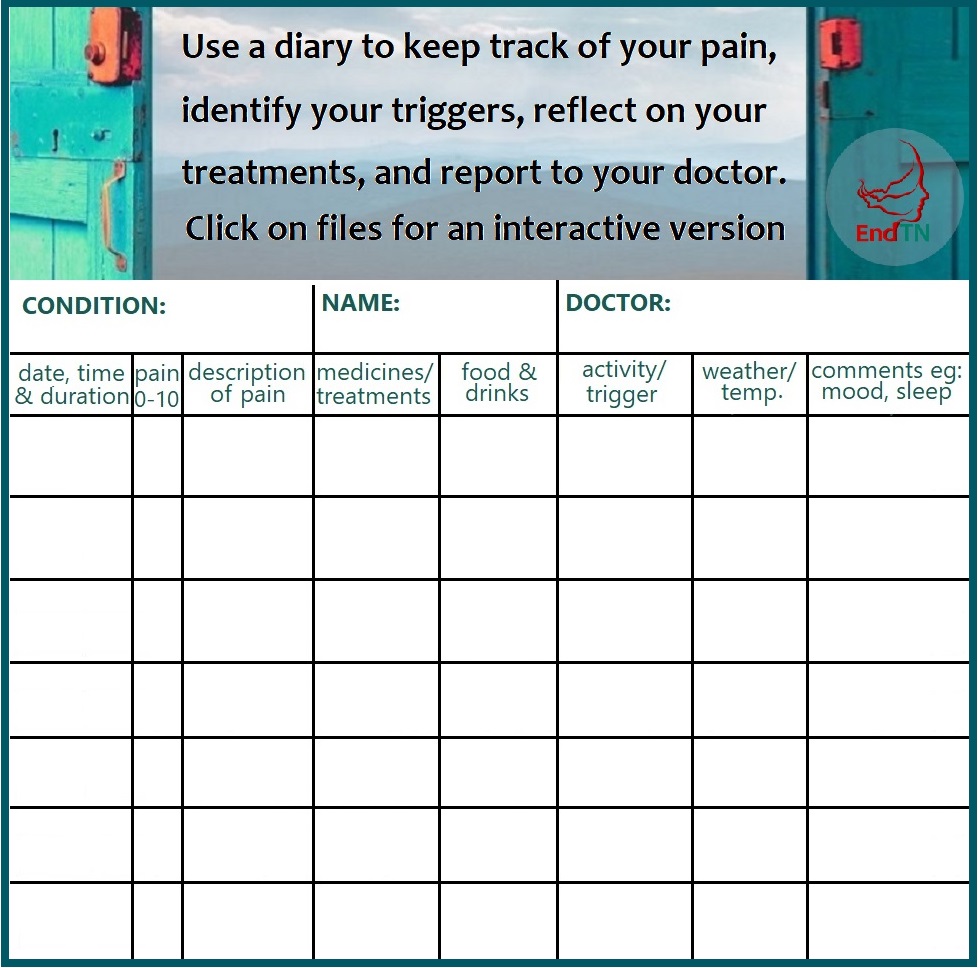
Getting correctly diagnosed with trigeminal neuralgia is, for many people, a long, painful and frustrating business. Little training is given about it in medical school – my GP told me that he had had perhaps ten minutes teaching on TN in a lecture on neurological conditions back in his first year of training. This isn’t surprising – there are numerous rare conditions and if they were all studied in any depth at med school (say 20 minutes each!) then it would probably take decades to get a medical degree!
This means few GPs (primary care physicians) will recognise the symptoms, or have even heard about trigeminal neuralgia, unless they have previously had a patient with the condition.
Dentists may be more likely to know about it than doctors, not least because it’s the trigeminal nerve they inject you in to numb your teeth! But they also receive little training on trigeminal neuralgia in dental school and again, unless they have had previous patients with the condition, may not recognise the symptoms.
For most of us, a confirmed diagnosis will come from a neurologist. The sooner you are referred by your doctor for a neurological consultation, the better. Even if your GP or dentist does recognise your symptoms as trigeminal neuralgia, it is still important they refer you to see a neurologist.
Why do you need to see a neurologist?
A neurologist is what it says on the tin – a specialist in the nervous system, who will have the knowledge and expertise to give you an accurate diagnosis and the best treatment plan.
Trigeminal neuralgia does have a number of symptoms in common with other face pain conditions. An experienced neurologist will know what to look for that could be causing the pain – such as nerve compressions, tumour, multiple sclerosis and other causes. Be aware, though, that even within the neurology field, there are still different levels and areas of expertise, so you will want to see a neurologist who has a working knowledge of trigeminal neuralgia and other face pain conditions.
How will the neurologist help you?
The neurologist will make or confirm a diagnosis of your condition and develop treatment plans. They will be able to offer advice on managing the condition.
What should I take to my neurology appointment?
It is helpful for the neurologist and yourself to document information, so you don’t have to rely on being able to talk, or remember details on the day. Take as much relevant information with you as you can, and make sure to describe your symptoms clearly and accurately.
Symptoms list
Write a list of all the symptoms you experience, so you don’t have to rely on memory. Write it on paper rather than in your phone, because you can give it to the neurologist to keep. It also means you can take your time in the weeks before your appointment jotting down the symptoms as they occur, rather than having to remember them all on the day.
Pain diary
Record a pain diary for a few weeks before your appointment and take it with you. In it include information like time, triggers, pain levels. There are different apps available for your phone, but again, have a paper copy for the neurologist. You may also prefer to include a column for your symptoms in the pain diary rather than write out a separate list.

Diagrams
Draw the areas where you experience pain on a simple line-drawing of a face and head. Do two diagrams – one face on and one profile, to give the best information. You may need to write some notes too – a pain deep in the ear or beneath the tongue might be tricky to draw accurately.
Medication list
Write out a full list of any other medications you are taking, including supplements and natural remedies. The neurologist needs to know, in case there are dangerous interactions with the medicines they want to prescribe you.
Pain scale
It’s hard to quantify pain with a number, as pain is subjective. Your 4 or 8 or ten may not be the same as my 4 or 8 or 10. But medical professionals will often ask us to number our pain on a scale of 1 to 10. Work out a pain scale that is useful for you, where each number represents a particular physical state or functioning ability. Or use this pain scale that describes each number in a way that conveys the effect of the pain. For me, 1 = mild pain, easy to ignore, and 10 = extreme, excruciating pain that makes me immobile and only semi-conscious.
(If the neuro asks you to number your pain out of 10, don’t say 11 or 12, or higher. Exaggerating undermines your case as it can make them think your issues are psychological.)

List of Questions
Appointments are generally short. To get the best out of the time, go with a list of questions. Have them written down so you don’t waste the time trying to remember whatever it was you wanted to ask.
Take a notebook and/or support person with you, and record the explanations, diagnoses and treatment regime your neurologist gives you, plus any answers to your questions. Unless you have an perfect memory, it is tricky remembering detailed and medically technical conversations later.
What can I expect to happen at my neurology appointment?
The neurologist will ask questions and take a detailed history of your symptoms, such as:
how long you have been experiencing episodes of pain,
how often episodes occur,
duration of episodes,
the nature of the pain, e.g. stabbing, burning etc
the intensity of the pain, ie, where you would rate it on a pain scale,
the site of the pain,
any triggers you have identified.
Think about how to best describe the nature of your pain – aching, burning, lancinating, cold stabbing, hot stabbing etc. Metaphors like ‘it feels like a blowtorch on my face’ are very expressive, and good for explaining to friends and family, but not necessarily helpful for explaining pain to a doctor, who will be focused on more literal descriptions.
The neurologist may also want to know how the symptoms impact your life, and how you can function from day to day, what you can and can’t do. For example, you might not be able to eat chewy food any more, or wear glasses, or sleep lying down.
They may want to touch your face to see if touch triggers your pain. You do not need to let them do this – a comprehensive pain diary, and a diagram of your painful areas will give them a clear picture of symptoms and triggers.
The neurologist should send you for a MRI scan which will show what, if anything, is happening inside your head, and rule out more serious, dangerous issues like tumours or lesions.
Trigeminal neuralgia can be diagnosed on symptoms alone, but they may decide to order a more detailed MRI (3D CISS) to look for veins or arteries compressing the nerve.
Depending on your particular symptoms, they may want to send you for further testing, like blood tests. Trigeminal neuralgia cannot be diagnosed through a blood test, but other conditions with symptoms including nerve pain can. Mine sent me to see a maxillofascial surgeon, as he suspected tempero-mandibular jaw disorder, which causes similar pain to trigeminal neuralgia. If your neurologist sends you for further testing, they will suspect, or want to rule out other conditions that blood tests do show. If this happens, ask your neurologist what they are looking for.
If you don’t understand something they say, ask them to explain – or have your support person do the talking and recording if you are in too much pain to manage yourself.
What treatment can I expect the neurologist to prescribe?
Neurologists usually prefer to start treatment with a non-invasive approach, that is, using medicine rather than surgeries or procedures. The most effective medicines for trigeminal neuralgia are anti-convulsants and the first choice is usually Tegretol (Carbemazepine) or Gabapentin (Neurontin). They may also prescribe you with a muscle relaxant such as Baclofen, and or an anti-depressant such as amytriptyline.
It is rare that a newly-diagnosed person will be advised to try surgery straight away, as it is riskier, but if your neurologist feels meds aren’t the best route for you, then they could refer you on to a neurosurgeon to discuss surgical options.
Will any neurologist do?
Not all neurologists are created equal! Even within the neurology field there are different specialisms.
Don’t be afraid to ask for a neurologist experienced in treating trigeminal neuralgia.
~ ~ ~ ~ ~ ~ ~ ~
The better prepared you are with accurate and relevant information,
the easier it will be for the neurologist to make a correct diagnosis.
Good luck!


This is great information. Honestly, I think we should all get into the habit of journalling our symptoms any time that we’re making an appointment with a doctor or a specialist. It’s a great way to make sure that you are addressing the whole problem. As a patient, it’s easy to forget that they are only seeing a snapshot when running tests and meeting with us. The more information that we can provide, the better they can help us to address whatever is going on.
LikeLiked by 1 person
That’s right, the more information we can give the better – and writing it down beforehand helps you see what’s relevant and what’s not too
LikeLike
I’m definitely going to be using this in the future the next time I see my neurologist. Great article.
LikeLiked by 1 person
Thank you – glad it’s useful for you
LikeLike
great tips! I wish you posted it two years ago when I was looking for one for my late grandmother
LikeLiked by 1 person
Thanks Lyosha – sorry I wasn’t quicker off the mark!
LikeLike
Great tips, thank you for sharing. I would not have thought about these before reading your post.
LikeLiked by 1 person
Hope you never need to use them!
LikeLike
Very detailed, and great information on a neurology consultation. This is definitely helpful. I’ll forward this over to a few family, and friends.
LikeLiked by 1 person
Glad it’s helpful for you
LikeLike
This is so good to know before a neurology consultation. I like to know what to expect and what will happen during and after my visit.
LikeLiked by 1 person
Knowing what to expect does help make things go smoothly
LikeLike
These are excellent tips. We want and need to get the best from a neurologist (or any doctor) and really, they can only help us if we help them. And I totally agree, not all neurologists are created equal!!
LikeLiked by 1 person
They really aren’t – we need to value the good ones.
LikeLike